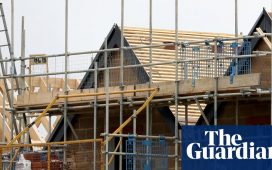Bailiffs are evicting more renting households than at any time in the last six years, the Ministry of Justice has said, as protesters chanted for rent controls outside the HQ of Britain’s biggest listed private landlord.
More than 100 members of the London Renters Union (LRU) set off red and blue smoke canisters as they descended on the glass and steel office of the property firm Grainger, which rents out more than 10,000 homes in the UK bringing in a 28% pretax profit margin on nearly £100m a year in rent.
MoJ figures released on Thursday showed county court bailiffs evicted 2,682 households in England and Wales in the first three months of this year as a result of landlords issuing section 21 “no fault” eviction notices. This was the highest level since the start of 2017 despite the government first promising to end the practice in April 2019.
The protest came as long-promised legislation intended to improve renters’ rights returned to parliament this week. But the housing charity Shelter claimed the renters (reform) bill was “in tatters” having been amended after lobbying from landlords, leaving renters “trapped in the same hellish conditions they’ve endured for decades”.
The protesters chanted “Rents up! Fight back!” and “Their profit, our pain” outside the HQ of the FTSE 250-listed company near Tower Bridge in London. They claimed Grainger’s higher than average rents for what it describes as “high-quality mid-market” apartments is driving up rents more widely. Grainger’s chief executive, Helen Gordon, last year supported the government’s decision to delay the end of “no-fault” evictions until court reforms are made.
The homelessness charity Crisis said the figures showed more than 92,000 households in England had received a no-fault eviction notice since then, causing tenants “unimaginable stress and uncertainty”.
Average UK asking rents increased 7.2% to £1,223 a month in the last year, figures from Zoopla show. The highest average rent in the UK is £2,121, in London.
A spokesperson for Grainger said it supported efforts to improve standards for renters and said its rents rose in line with wages and with the average tenant spending 28% of their income on rent.
“The solution to the problems faced is increasing supply, and we are committed to continuing to support the delivery of new homes for rent, whilst also driving up overall standards in the sector, which is why we support the ambitions of both political parties to improve standards for renters,” a spokesperson said.
The protesters carried placards outside Grainger’s offices saying “Landlords: get a proper job” and “Gentrifiers live here”. Leading chants on a megaphone was Conall Ó Brolcháin, a member of the LRU who said he was forced out of his home in 2022 when his landlord demanded a 51% rent increase, justifying the hike by citing higher rents in a new Grainger block across the road.
“This was a hugely distressing time for us, giving us little notice to try and find another home,” he said. “We are now spending around half of our wages on housing costs. If Grainger and other corporate landlords are allowed to continue ripping apart our communities like this, I will no longer be able to afford to live in the place where I work.”
Asif, 29, a junior doctor who declined to give his second name, said he had grown up near the Olympic Park in Newham, east London, where thousands of flats have been built since 2012. Despite having three years’ experience as an NHS doctor, he said he had been priced out of the area when his private landlord evicted him in 2022 and rented the home for 30% more.
“So many people need a council house and it feels like a slap in the face to watch these luxury flats go up which nobody in my community can afford,” he said.
A Grainger spokesperson added: “Some of the statements of the protesters are misplaced and insulting to our colleagues who do a remarkable job serving our customers, reflected by the high levels of satisfaction and retention amongst our customers across the country.”










